#learnjapanese
Text

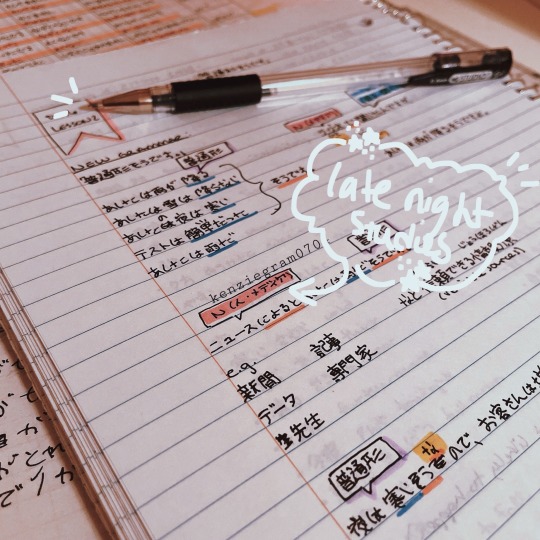
Late night studies, featuring my notes. 😌 These were taken back in May when I was still doing an online Japanese language course.
#study japanese#study motivation#study notes#studyinspo#studyblr#study blog#learn japanese#langblr#learnjapanese#japanese studyblr#japanese studyspo
52 notes
·
View notes
Text
More vocabularies from Totoro:
お父さん (Otousan) - Father
お母さん (Okaasan) - Mother
妹 (Imouto) - Younger sister
兄 (Ani) - Older brother
おばあちゃん (Obaachan) - Grandma
おじいちゃん (Ojiichan) - Grandpa
夜 (Yoru) - Night
星 (Hoshi) - Star
空 (Sora) - Sky
お弁当 (Obento) - Lunchbox
雨 (Ame) - Rain
風 (Kaze) - Wind
クスリ (Kusuri) - Medicine
お守り (Omamori) - Amulet
Royalty Free Music: https://www.bensound.com
License code: SVV29XKEGP6O5RQG
#nihongo#jlpt#learnjapanese#japanese language#jlptn5#hiragana reading practice#hiragana#learn kanji#japanese kanji#ghibli#totoro
83 notes
·
View notes
Photo
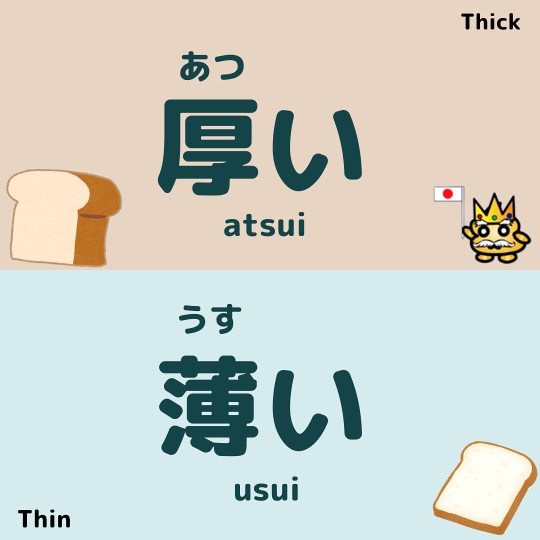
Thick in Japanese is 厚い(Atsui) 🍞 Thin in Japanese is 薄い(Usui) 👚 Do you have any Japanese questions? It is the perfect time to start learning Japanese🇯🇵 Take Japanese lessons online with our professional Japanese teachers \(◕ω◕)/☆ We can teach you Japanese step by step and make the customized lesson for you. You can take a FREE trial lesson here now🌸👉 http://kakehashijapan.com #learnjapaneselanguage #studyingjapanese #Japanesevocabulary #nihongo #learnjapanese #studyjapanese #kanji #Japanese #Japanesephrase #learningjapanese #japanesewords #Japaneselearner #japanese #Japan #japaneselanguage #japaneselessons #japaneselesson #learnjapanese #japaneseteacher #japaneseclass #japanesephrases #JLPT #japaneselanguage #learningjapanese #日本語 #日本語勉強中 #日本語勉強 #🇯🇵 #jlptn5 #jlptn4 #jlpn3 #jlptn2 #kanjistudy https://www.instagram.com/p/CpZFFr3SONg/?igshid=NGJjMDIxMWI=
#learnjapaneselanguage#studyingjapanese#japanesevocabulary#nihongo#learnjapanese#studyjapanese#kanji#japanese#japanesephrase#learningjapanese#japanesewords#japaneselearner#japan#japaneselanguage#japaneselessons#japaneselesson#japaneseteacher#japaneseclass#japanesephrases#jlpt#日本語#日本語勉強中#日本語勉強#🇯🇵#jlptn5#jlptn4#jlpn3#jlptn2#kanjistudy
72 notes
·
View notes
Text
JLPT N5 - くなる and くする
This grammar point is very simple. You use くなる when the condition of something becomes a certain way by itself. On the other hand, くする is used when the condition of something is changed by an outside agent (either a person or a thing). In this post, let’s look at these two very basic constructions and how the Japanese works.
Here is your vocabulary:

【The Grammar】
The grammar is very simple. First, you take an adjective or a noun and change them to their adverbial forms. For example, the adjective 長い has an adverbial form of 長く. The noun ひま has an adverbial form of ひまに.
After you make the adverbial forms of the adjective or the noun, you just put it before either なる or する. That’s it!
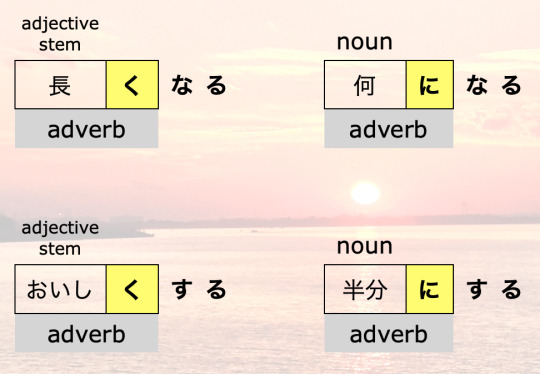
We talked about the く connector in this post and about the adverbial に in this post.
I should point out that while this grammar point appears in most JLPT books and websites as くなる and くする, as you can see in the picture above, nouns don’t use く! For that reason, I choose to call this point adverb ✙ なる and adverb ✙ する.
【adverb + なる】
Here are some examples with なる:
① 熱が下がって、気分がだいぶ{よくなりました}。
=fever will go down and then feeling became considerably better
= My fever went down and then I felt much better.
② この仕事が終わったら、少し{ひまになる}と思います。
= when work finishes, a little bit, will become free, I think
= I think that when work finishes, I’ll have more time.
③ このごろ仕事が減って、前ほど{忙しくなくなった}。
= these days, work decreased and so as much as before, became not busy
= These days, I have less work and so I’m not as busy as before.
④ きみは{大人になったら}、{何になりたい}の。
= when you become an adult, what want to become
= When you grow up, what do you want to be (and explain)?
Some things to notice:
In example 1, the sense is that when the fever went down, the person’s mood got better by itself.
In example 2, the condition of having more free time arises naturally when work decreases. (ひま can have the connotation of having absolutely nothing to do and can be considered rude by some people. I use the word for myself sometimes, but I never seriously refer to other people as ひま.)
Concerning example 3, the negative form of 忙しい is with 忙しくない. If you want to make THAT into an adverb, it will become 忙しくなく. This was very difficult for me when I was just beginning Japanese.
Finally, Example 4 shows that the question word of 何 can be treated as a noun. This makes sense if you think of it as a placeholder for whatever answer the listener will give. Also, because the speaker uses the word きみ we know that the speaker and listener are close. It would make sense if it were a parent-child relationship. きみ is NOT used with people that you have just met or that you don’t know well!
【adverb + する】
Here are some examples with する:
⑤(父が子どもに)もっと部屋を{きれいにしなさい}。
= father to his child: a little bit more the room, make it clean
= Clean up your room a bit more.
⑥ このケーキ、ちょっと大きいから、{半分にして}ください。
= this cake, a bit big and so make it half please
= This cake is a bit (too) big so please cut it in half.
⑦ スカートを5センチぐらい{短かくして}ください。
= this skirt, about 5 centimeters make it short please
= Please shorten this skirt about 5 centimeters.
Notice that examples 5, 6 and 7 all include someone (other than the speaker) making a thing (a room, a cake, and a skirt) a different condition than the current one. This is when you will want to use adverb + する.
【Conclusion】
The grammar points of adverb ✙ なる and adverb ✙ する are pretty simple to understand. That is why they are considered Level N5. Adverb ✙ なる shows a person or a thing becoming a different condition by itself. Adverb ✙ する shows a person or a thing changing to a different condition by a different person or thing.
Thanks for reading, and see you next time!
Rice & Peace,
– AL (アル)
👋🏾
#japanese#japanese grammar#learn japanese#japanese language#japanese lesson#japanese study#japanese vocabulary#japanese vocab#japanese verbs#studying Japanese#japaneselessons#learnjapanese#japanese studyblr#japanese langblr#JLPT#JLPT N5#jlptn5#にほんご#日本語#日本語の勉強#一緒日本語#language#languages#language study#language studyblr#language blr#IsshoNihongo
388 notes
·
View notes
Text

What's your ikigai? 🌟🧘♂️ Here's ours: helping millions of people learn new languages. ❤️🌎
#mondly#languages#languagelearning#learnlanguages#japanese#learnjapanese#japaneselesson#didyouknow#japaneseforbeginners#japaneselanguage#japaneseteacher#japaneseclass#japaneselearning#japaneseonline#ikigai#reasonforbeing#nihongo
22 notes
·
View notes
Text
Useful Anime Phrases | Learn Basic Japanese Phrases
Are you a big fan of anime? Many foreigners are drawn to Japan in part because of their love of anime. Impress your friends with these most popular Japanese expressions in anime below.
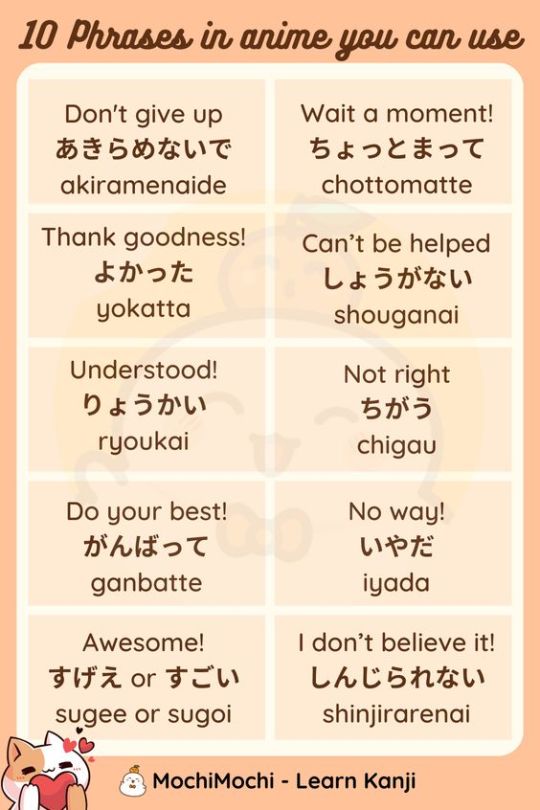
5 notes
·
View notes
Text
📚(๑・ω・)📣・ω・)📣💪(•ᴗ•✍)📚
Strengthen your pronunciation with repetition!
💮Listen
💮Say Aloud
💮Write
🔁Repeat!
-📚ー
✍𝐋𝐞𝐭'𝐬 𝐖𝐫𝐢𝐭𝐞 𝐇𝐈𝐑𝐀𝐆𝐀𝐍𝐀!!【らりるれろ】
第9課 | (書き方/筆順)
-💬ー
(๑・ω・๑)[๑・▿・๑](๑・ω・๑)
🤖 Especially in the digital age, it's paramount to incorporate kinaesthetic learning into your language learning routine!
🎒More importantly, no one is just ONE type of learner!
👩🎓Students benefit from engagement of ALL learning styles
#japanese#japanese language#japan#learn japanese#kiki#koko#quizbo#language#langblr#learnjapanese#language learning#languages#japanese langblr#langblog#new langblr
3 notes
·
View notes
Photo

自炊する じすいする Jisui-suru Cook for oneself 毎日、自分で自分の食事を作ります。自炊します。 😶最近、一人暮らし始めたんだー。 😮へー。自炊してるの? Do you cook for yourself? 😬うーうん。コンビニ弁当ばっかり。 😃😃😃 🔊Audio available. Link in bio @tomoe_sensei ——/// #nihongo #nihongojapanese #studyjapanese #日本語 #日本語勉強中 #日本語勉強 #にほんご #にほんごべんきょう #japones #learnjapanese #日本語 #japaneselesson #japaneseclass #learningjapanese #studygram #japanesestudygram #日本語勉強 #日本語能力試験 #JLPT #日语 #japanesewords #dailyjapanese #日本語交流 #japaneseidiom #japanesevocabulary #japaneseculture https://www.instagram.com/p/ChFM8-rpm-Y/?igshid=NGJjMDIxMWI=
#nihongo#nihongojapanese#studyjapanese#日本語#日本語勉強中#日本語勉強#にほんご#にほんごべんきょう#japones#learnjapanese#japaneselesson#japaneseclass#learningjapanese#studygram#japanesestudygram#日本語能力試験#jlpt#日语#japanesewords#dailyjapanese#日本語交流#japaneseidiom#japanesevocabulary#japaneseculture
100 notes
·
View notes
Text
The Ultimate Guide to Staying Motivated When Learning Japanese
What are some tips for staying motivated when learning Japanese?
Here are some tips for staying motivated when learning Japanese:
Set realistic goals. Don't try to learn too much too soon, or you'll get discouraged. Set small, achievable goals for yourself, and celebrate your successes along the way.
Find a learning method that works for you. There are many different ways to learn Japanese, so find a method that you enjoy and that fits your learning style. There are many free resources available online, as well as apps, textbooks, and even in-person classes.
Make it fun! Learning a new language should be enjoyable, so find ways to make it fun for yourself. Watch Japanese movies and TV shows, listen to Japanese music, or read Japanese books or manga.
Immerse yourself in the language. The best way to learn a language is to immerse yourself in it as much as possible. This means surrounding yourself with Japanese language and culture. You can do this by watching Japanese TV shows and movies, listening to Japanese music, reading Japanese books and manga, or even traveling to Japan.
Have a reason for learning Japanese. What is your motivation for learning Japanese? Do you want to travel to Japan? Watch Japanese anime or movies without subtitles? Talk to Japanese friends or family? Having a clear goal in mind will help you stay motivated when things get tough.
Don't be afraid to make mistakes. Everyone makes mistakes when they're learning a new language. It's important to not let this discourage you. Instead, view mistakes as an opportunity to learn and improve.
Find a language partner. Learning with a language partner is a great way to stay motivated and to practice your Japanese speaking skills. You can find language partners online or through local Japanese language schools or meetups.
Reward yourself. When you reach a learning goal, reward yourself with something you enjoy. This will help you stay motivated and to keep working towards your goals.
I hope these tips help you stay motivated when learning Japanese. Learn more about the Japanese language here! Tokyo International Education Institute

#study abroad#language#language courses#study in japan#learnjapanese#japaneselanguage#japaneselearning
7 notes
·
View notes
Text
instagram
🍁🍂Autumn? Ooh la la! Learn haiku-worthy Japanese vocab with us at✨https://wp.me/p9kdOE-3m2✨
・
🖥🖱Visit us at ieindigoeast.com to not only hear 𝗝𝗮𝗽𝗮𝗻𝗲𝘀𝗲 𝗽𝗿𝗼𝗻𝘂𝗻𝗰𝗶𝗮𝘁𝗶𝗼𝗻𝘀 & 𝗲𝘅𝗮𝗺𝗽𝗹𝗲 𝘀𝗲𝗻𝘁𝗲𝗻𝗰𝗲𝘀 for multiple levels with Kiki+Koko &QUIZBO™, but also to learn today’s vocabulary word’s usage, alternate readings, kanji details, and more!
💥Also, enjoy newly added politeness and difficulty ratings for each example sentence!
・
👋(・ω・)[ ・▿・ ]👋 (・ω・)
❤/💬/🔖/✉️ありがとう!!
・
💡𝘾𝙖𝙣 𝙮𝙤𝙪 𝙜𝙪𝙚𝙨𝙨 𝙩𝙤𝙙𝙖𝙮’𝙨 𝙨𝙚𝙘𝙧𝙚𝙩 𝙘𝙤𝙙𝙚?
You’ll find the answer at the end of today’s lesson!
✨https://wp.me/p9kdOE-3m2✨
・
📚Access the WotWw/Q archives by visiting ieindigoeast.com and selecting the 𝐖𝐨𝐫𝐝 𝐨𝐟 𝐭𝐡𝐞 𝐖𝐞𝐞𝐤 𝐰/ 𝐐𝐔𝐈𝐙𝐁𝐎™ banner.
・
-🏷️ー
#japanesestudygram#learnjapanese#japanese#japaneseteacher#studygram#studyjapanese#日本語勉強#日本語#日本#にほんご#nihongo#animation#wordoftheweek#quizbo#kiki#koko#jlpt#japanesevocabulary#vocabulary#vocab#単語#言葉#言語#studyingjapanese#日本語教師#japaneselanguage#college#jazz#bossanova#langblr
3 notes
·
View notes
Text
instagram
🌿📔𝓕𝓸𝓻 𝓵𝓮𝓲𝓼𝓾𝓻𝓮 𝓸𝓻 𝓵𝓮𝓪𝓻𝓷𝓲𝓷𝓰ーRead Kiki’s Latest 🇯🇵 Entry at the Link Below:
☕https://wp.me/p9kdOE-3ku☕
・
・
♡嬉嬉の日記#0004|💮📔能力を伸ばす ||♡Kiki+Koko™の紀行文
🌿https://wp.me/p9kdOE-3ku🌿
・
・
📝 This Japanese journal entry can be read for learning or just for fun!
📮Either way, we hope you’ll join us on our journey
✉Subscribe to join the journey, and the many entries it will bring.
・
・
♡Kiki+Koko™: 🌿https://ieindigoeast.com/lovekikikoko🌿
・
・
・
・
📷@ieindigoeast × @kikikokonihongo
・
・
-🏷️ー
#japaneseteacher#japanese#japaneselanguage#travelogue#日本語#japanesegrammar#learnjapanese#studyjapanese#studygram#study#日本語勉強#japanesestudygram#japanesestudy#languagestudy#languagestudygram#blogger#blog#aesthetic#library#mechanicalkeyboards#keyboard#aesthetic#mechanicalkeyboard#studyaesthetic#books#langblr#japanese langblr#Instagram
3 notes
·
View notes
Photo
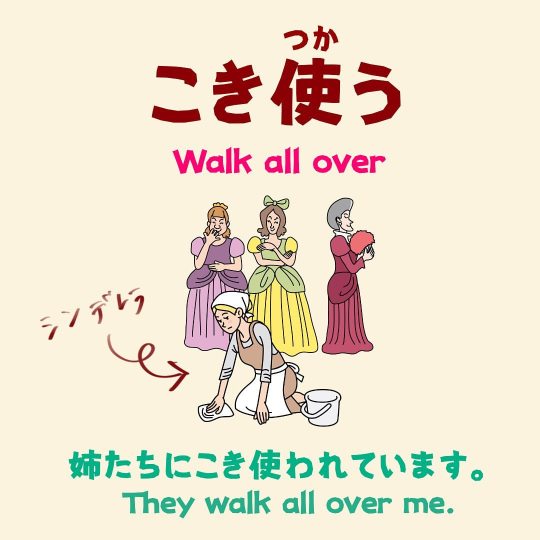
こき使う Walk all over… シンデレラは、毎日、お姉さんやお母さんにこき使われていましたね。。。😢 😃😃😃 🔊Audio available. Link in bio @tomoe_sensei ——/// #nihongo #studyjapanese #日本語 #日本語勉強中 #日本語勉強 #にほんご #にほんごべんきょう #japones #learnjapanese #日本語 #japaneselesson #japaneseclass #learningjapanese #japanesestudygram #日本語勉強 #日本語能力試験 #JLPT #日语 #japanesewords #dailyjapanese #japaneseidiom #japaneseculture #シンデレラ #cinderella #昔話 https://www.instagram.com/p/Ch46yl8p-a9/?igshid=NGJjMDIxMWI=
#nihongo#studyjapanese#日本語#日本語勉強中#日本語勉強#にほんご#にほんごべんきょう#japones#learnjapanese#japaneselesson#japaneseclass#learningjapanese#japanesestudygram#日本語能力試験#jlpt#日语#japanesewords#dailyjapanese#japaneseidiom#japaneseculture#シンデレラ#cinderella#昔話
47 notes
·
View notes
Photo

Today’s Counter is: 個 (こ – ko)🍎 ★ You can use the Japanese counter 個 (こ – ko) to count a wide variety of things such as apples, eggs, and other small compact objects. ★ The Japanese word for the one (small compact object) is 1個 (いっこ – ikko). ★ The Japanese word for two (small compact objects) is 2個 (にこ – niko). ★ The Japanese word for three (small compact objects) is 3個 (さんこ – sanko). Do you have any Japanese questions? It is the perfect time to start learning Japanese🇯🇵 Take Japanese lessons online with our professional Japanese teachers \(◕ω◕)/☆ We can teach you Japanese step by step and make the customized lesson for you. You can take a FREE trial lesson here now🌸👉 http://kakehashijapan.com #learnjapaneselanguage #studyingjapanese #Japanesevocabulary #nihongo #learnjapanese #studyjapanese #japanesebeginner #Japanese #Japanesephrase #learningjapanese #japanesewords #Japaneselearner #japanese #japaneselanguage #japaneselessons #japaneselesson #learnjapanese #japones #japaneseclass #japanesephrases #JLPT #japaneselanguage #learningjapanese #日本語 #日本語勉強中 #日本語勉強 #🇯🇵 #jlptn5 #jlptn4 #jlpn3 #jlptn2 #jlptn1 https://www.instagram.com/p/CqW346sStj4/?igshid=NGJjMDIxMWI=
#learnjapaneselanguage#studyingjapanese#japanesevocabulary#nihongo#learnjapanese#studyjapanese#japanesebeginner#japanese#japanesephrase#learningjapanese#japanesewords#japaneselearner#japaneselanguage#japaneselessons#japaneselesson#japones#japaneseclass#japanesephrases#jlpt#日本語#日本語勉強中#日本語勉強#🇯🇵#jlptn5#jlptn4#jlpn3#jlptn2#jlptn1
27 notes
·
View notes
Text
14.4) Conditional Forms (と)
The last conditional form we will talk about is the conditional と particle. First though, it’s important to distinguish between this usage and other usages of the と particle. Just like に and で, there are many ways you will see/hear the conditional と used!
Below are 6 sentences that use the と particle, but NOT the conditional と.
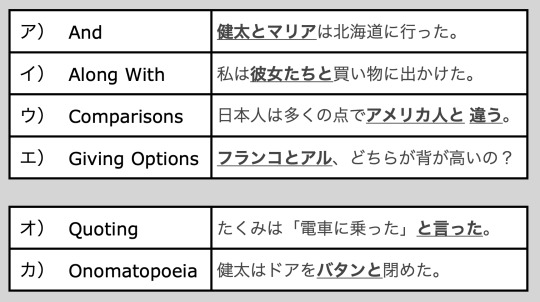
If you want to read about these uses, check out these posts I made about them:
【Examples ア-エ】
【Examples オ and カ】
Also, I already wrote a post about the conditional と particle that you can read here. In this post I’m going to be looking at conditional と in a different way. Here is your vocabulary:
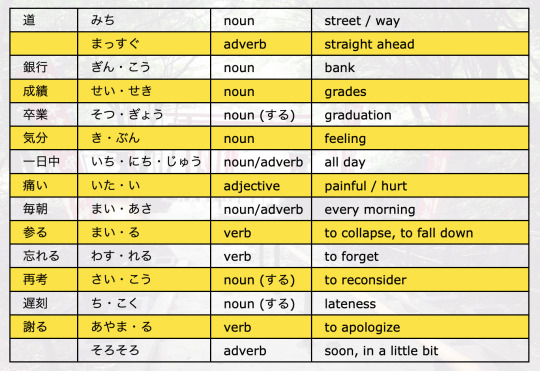
【The Grammar of と】
The conditional と particle can attach to verbs, adjectives and noun-copula pairs (but only in the form of noun+だ).

【Did It Happen Or Not?】
When you look at sentences with the conditional と, there are two possibilities when it comes to the second clause:

If we think of this with English counterparts, here are two examples:
[Case1] When / If water reaches 100℃, it boils.
[Case2] When I walked in the room, the students stopped talking.
In case 1, the event in the first clause (water reaching 100℃) inevitably leads to the event in the second clause (it boiling). That is to say, the second clause hasn’t actually happened yet... but if the first clause happens, it will.
Compare that to case 2, where both events have already happened. This is a big difference between the two cases. Now, here are some Japanese examples:
①{この道をまっすぐ行くと}、{銀行があります}。
= when/if the/this street go straight, there will be a bank
= When/if you go straight down this street, there will be a bank.
②{成績が悪いと}、{学校を卒業できないよ}。
= when/if grades are bad, can’t graduate from school, you know
= When/if your grades are bad, you can’t graduate.
③{学校に行くと}{休みだった}。
= when go to school, it was rest
= When I went to school, it was closed.
【The Timing of と】
Another thing to think about when using the conditional と is the timing of the events. と gives the nuance that both happen almost at the same time.
④{天気がいいと}{気分がいい}。
= when/if the weather is good, feel good
= I feel good when/if the weather is good.
Example 4 is saying that the weather being good directly leads to the speaker also feeling good. The nuance of the timing is that as soon as or soon after the weather is good, the speaker feels good. Sometimes, this means that you can translate the と as “once”.
We will come back to this idea of timing when we compare the conditional forms. 😉
【When or If?】
In general, if the second clause is in past form, the English translation will use “when”.
Here are two more examples:
⑤ 一日中{パソコンを使うと}、{目が痛くなります}。
= all day when/if use a computer, eyes hurt
= When / If I use the computer all day, my eyes hurt.
⑥ 毎朝{起きると}{コーヒーを飲む}。
= every day when wake up, drink coffee
= Every day when I wake up, I drink coffee.
For example 5, there won’t be a difference if you think of the と as “if” or as “when”. However, there is a HUGE difference between “when I wake up” and “if I wake up”! This shows that the action or adjective in the first clause is the key to the English translation. Some words will naturally translate to “if”, and some words will naturally translate to “when”. Many words though, can use either and make sense.
【〜ないと】
The last thing we should talk about is the “warning” usage of conditional と. Because the conditional と expresses a natural consequence or an inevitability, it is often attached to the negative form of a verb in order to warn the listener of some... negative consequence. An extension of this is indicating the speaker’s responsibility or duty to do something.
There are three kinds of clauses you will see / hear after a ないと clause: (1) a grammatically positive phrase with a negative meaning or (2) a grammatically negative phrase with a negative meaning. Here are some examples:
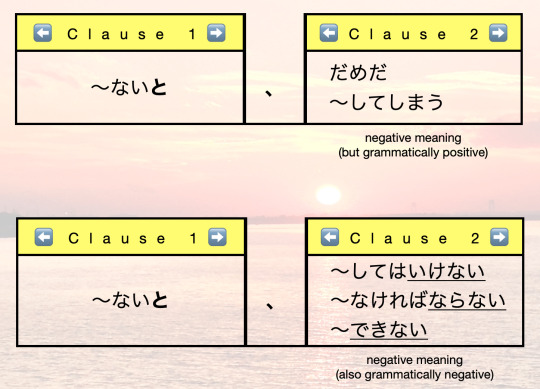
だめ simply means “it’s not good”.
〜してしまう has a nuance of something unexpected happening. For example if you use the verb 参る with しまう, you get 参ってしまう which means “unexpectedly collapse or fall down”.
〜してはいけない is a roundabout way of saying “don’t do 〜”. For example if you use the verb 忘れる in this construction you get 忘れてはいけない. This basically means “don’t forget”.
〜なければならない means “have to do 〜”. If you use the word 再考する in this construction, you will get 再考しなければならない。This means “have to reconsider”.
Finally, 〜できない means “can’t do 〜”
Here are some examples with Japanese sentences:
⑦{早く起きないと}{遅刻するよ}。
= in an early way, if don’t get up, will do lateness
= If I don’t get up early, I’ll be late!
⑧{アンに謝らないと}{いけない}。
= to Ann, if I don’t apologize, it won’t go/do
= I have to apologize to Ann.
Notice how clause 2 in example 7 is grammatically positive (遅刻する) but has a negative meaning. On the other hand, clause 2 in example 8 is negative (いけない) and also has a negative meaning. This is something you will see quite often after a ないと phrase.
The third possibility for what comes after a ないと clause is... nothing! Japanese often avoids being direct by simply not saying a phrase or a word. With ないと clauses, everyone knows that the following clause is something negative so it’s ok to just not say anything. The listener or reader can use their imagination to figure out the negative consequence(s). Here is an example:
⑨{そろそろ寝ないと}。
= well... soon if don’t sleep...
= Well... I need to sleep soon.
First off, we don’t actually know who the subject is in example 9 but we can assume that it is the speaker though. The speaker intentionally leaves off the second clause. We don’t actually know what will happen if he/she doesn’t sleep but because of the ないと, we know it won’t be good!
【Conclusion】
And that is what you should know about using the conditional と. I hope this post was helpful and informative. As always, if you have any questions, let me know!
The next post will be the last one in this conditional forms section, so look out for that. Good luck with your Japanese learning adventure!
Rice & Peace,
– AL (アル)
👋🏾
#japanese#japanese grammar#learn japanese#japanese language#japanese lesson#japanese study#japanese vocabulary#japanese vocab#japanese verbs#studying Japanese#japanese particles#japaneselessons#japanese langblr#learnjapanese#japanese studyblr#japanese conjunctions#japanese conditionals#language#languages#language study#language studyblr#language blr#日本語#日本語の勉強#一緒日本語#IsshoNihongo
154 notes
·
View notes
Text

We can relate. 😂 Do you know any untranslatable words in your language? 🧐
#mondly#MondlybyPearson#languages#languagelearning#learnlanguages#japanese#learnjapanese#japaneselesson#japaneseapp#japaneseforbeginners#japaneselanguage#japaneseteacher#japaneseclass#japaneselearning#japaneseword#wordoftheday#funny#hungry
6 notes
·
View notes
Text
Rainy Day In Japanese | Learn Japanese Words and Vocabulary
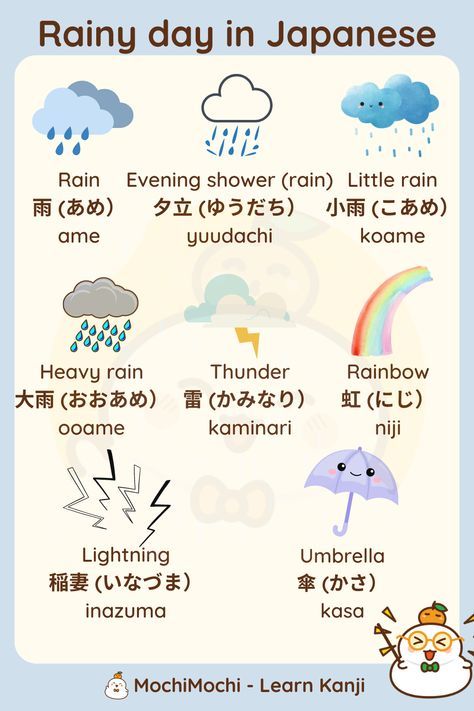
#RainyDayInJapanese#BasicJapaneseWords#japanesewords#japaneseconversation#conversationstarters#mochimochi#learnJapanese
5 notes
·
View notes